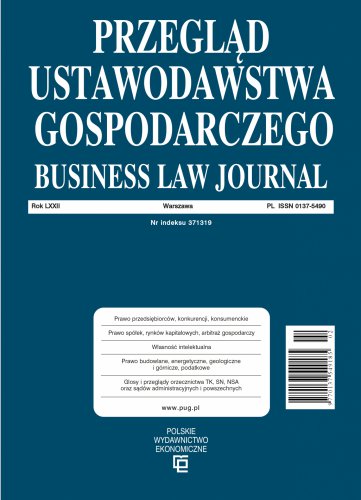The influence of moral norms on shaping the public expenditure law — the Polish perspective
The aim of this article is to determine the extent of dependence/relation between moral norms and public expenditure law established in Poland as well as to determine the impact of this law on the formation of citizenship. These issues have interdisciplinary nature, as they require to take into consideration the point of view (opinions) of lawyers, sociologists and economists. Elaborated diagram by the Authors has been a base for creation the following theses: on the one hand — moral norms, including social rules arising from universal Christian values, should directly and indirectly strongly influence legal regulations in the scope of public expenditure as well as education and citizenship; and on the other hand, and this is a reverse process — public spending may to a certain extend impact the content of moral norms. These theses have been verified on the basis of two pilot researches.
Moreover, the article, due to its aim, analyses the formation of public expenditure law in the context of public choice theory and principal-agent problem as well as verifies social evaluation of the connection between the content of moral norms and selected decisions concerning public expenditure.
References
Bibliografia/References
Buchanan, J. M. (1997). Finanse publiczne w warunkach demokracji. Systemy fiskalne a decyzje indywidualne. Wydawnictwo Naukowe PWN.
Buchanan, J. M., & Musgrave, R. A. (2005). Finanse publiczne a wybór publiczny. Dwie odmienne wizje państwa. Wydawnictwo Sejmowe.
Bunikowski, D. (2010). Podstawowe kontrowersje dotyczące ingerencji prawa w sferę moralności. Wydawnictwo Naukowe Uniwersytetu Mikołaja Kopernika.
CBOS (2019). Reakcje społeczne na rozwiązania tzw. Nowej Piątki PiS. Centrum Badania Opinii Społecznej, https://www.cbos.pl/SPISKOM.POL/2019/K_045_19.PDF
Dębowska-Romanowska, T. (2007). Charakter prawny i klasyfikacja tzw. wydatków sztywnych a granice swobody politycznej władz państwa. W: J. Głuchowski, J. Szołno-Koguc, & A. Pomorska (red.), Uwarunkowania i bariery w procesie naprawy finansów publicznych (279–292). Wydawnictwo Katolickiego Uniwersytetu Lubelskiego.
Ekelund, R. B., & Hébert, R. F. (2007). A history of economic theory and method. Waveland Press.
Fuller, L. L. (2004). Moralność prawa. Wydawnictwo ABC.
Gaudemet, P. M., & Molinier, J. (2000). Finanse publiczne. Polskie Wydawnictwo Ekonomiczne.
Głuchowski, J., Szołno-Koguc, J., & Pomorska, A. (red.) (2007). Uwarunkowania i bariery w procesie naprawy finansów publicznych. Wydawnictwo Katolickiego Uniwersytetu Lubelskiego.
Kiefer, D. (1997). Macroeconomic policy and public choice. Springer.
Kosikowski, C. (2011). Naprawa finansów publicznych w Polsce. Temida 2.
Lande, J. (1959). Studia z filozofii prawa. Państwowe Wydawnictwo Naukowe.
Lee, D. R. (2012). Public choice, past and present: The legacy of James M. Buchanan and Gordon Tullock. Springer.
Malinowska, E., & Misiąg, W. (2007). Finanse publiczne w Polsce. LexisNexis.
McGee, R. W. (2004). The philosophy of taxation and public finance. Springer Science & Business Media.
Modzelewski, E. (2006). Etyka a polityka. AlmaMer.
Moe, T. M. (1984). The new economics of organization. American Journal of Political Science, 28(4), 739–777. https://doi.org/10.2307/2110997
Mukherjee, S. (2005). Modern economic theory. New Age International.
Musgrave, R. A. (2000). Public finance in a democratic society: The foundations of taxation and expenditure. Edward Elgar Pub.
Musgrave, R. A., & Musgrave, P. B. (1989). Public finance in theory and practice. McGraw-Hill Book Company.
Ossowska, M. (1985). Normy moralne. Próba systematyzacji. Wydawnictwo Naukowe PWN.
Ossowska, M. (2000). Normy moralne. Próba systematyzacji. Wydawnictwo Naukowe PWN.
Owsiak, S. (1998). Finanse publiczne. Teoria i praktyka. Wydawnictwo Naukowe PWN.
Perelman, M. (1987). Marx's crises theory: Scarcity, labor, and finance. Praeger.
Radbruch, G. (2009). Filozofia prawa. Wydawnictwo Naukowe PWN.
Salachna, J. M., & Tyniewicki, M. (2017). The principle of substantial transparency of public finance and creation of the active citizenship. W: M. Radvan, J. Gliniecka, T. Sowiński, & P. Mrkývka (red.), The financial law towards challenges of the XXI century (conference proceedings) (71–85). Masaryk University. https://doi.org/10.5817/CZ.MUNI. P210-8516-2017
Salachna, J. M., & Tyniewicki, M. (2016). Moralność jako element podejmowania decyzji finansowych w sektorze publicznym. Prawo Budżetowe Państwa i Samorządu, 4(3), 9–23. https://doi.org/10.12775/pbps.2016.012
Salachna, J. M., Szafranek, A., & Tyniewicki, M. (2018). Selected moral values and their influence on financial decision making within the public sector: A case study of Poland. Zarządzanie Publiczne, 2(44), 29–40. https://doi.org/10.15678/zp.2018.44.2.02
Sutor, B. (1994). Etyka polityczna: Ujęcie całościowe Na gruncie chrześcijańskiej nauki społecznej. Wydawnictwo Kontrast.
Szyszkowska, M., & Kozłowski, T. (red.). (2001). Polityka a moralność. Liber.
Turner, J. H. (2008). Struktura teorii socjologicznej. Wydawnictwo Naukowe PWN.
Tyniewicki, M., & Kozieł, M. (2021). Current problems of financial law in Poland and in the Czech Republic including effects of the COVID-19 pandemic. Białostockie Studia Prawnicze, 26(4), 53–71. https://doi.org/10.15290/bsp.2021.26.04.04
Weingast, B. R. (1984). The congressional-bureaucratic system: A principal agent perspective (with applications to the SEC). Public Choice, 44(1), 147–191. https://doi.org/10.1007/bf00124821
Zasuń, R. (2017). Marchewka dla górniczych działaczy. WysokieNepiecie.pl, 10.03.2017, https://wysokienapiecie.pl/2127-marchewka-dlagorniczych-dzialaczy/ (pobrano 16.09.2020).


 Our website uses cookies in order to, among others, collect statistical data and ensure proper functioning of the site. Further use of the website without changing settings in your browser means that cookies will be saved in your device. Please note that you can always change these settings.
Our website uses cookies in order to, among others, collect statistical data and ensure proper functioning of the site. Further use of the website without changing settings in your browser means that cookies will be saved in your device. Please note that you can always change these settings.